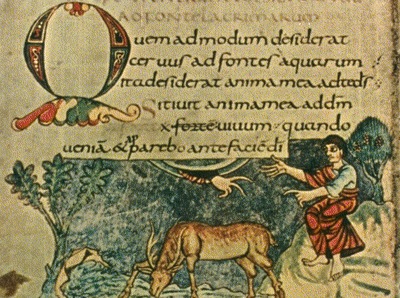How are expository and creative writing related? Can expository writing
be fictional? Can non-fictional writing be creative? Can fictional writing
be expository?
Many people inaccurately believe that, to be valid, expository prose writing must
always be objective, nonfictional, and non-creative, no matter what its
purpose; otherwise it defeats its primary reason for existing, which is to
factually inform. They hold this belief because they believe that any other
kind of expository prose distorts the facts of the matter by being
subjective or fictional.
These views are correct, as far as they go: if a written work's primary
purpose is to convey facts, there is no place for fiction i it because
fiction distorts or overlooks pertinent facts.
People who object to creativity in expository prose writing are correct
if by creativity they mean the power to introduce errors, imagine falsities,
or invent other kinds of unfactual things. Whenever the primary purpose of a
written work is to convey factual information, creative, nonfiction writing
is unquestionably the correct style of writing to apply.
There's absolutely nothing wrong with expository prose writing that's
objective and non-fictional; writing genres that possess these
characteristics are among some of the most important ones in the world and
without them it would be virtually impossible for society to get along. They
include newspapers, magazines, scientific reports, term papers, use and care
manuals, historical accounts, engineering documents, "how to" books, and
many, many more document varieties.
But people who totally reject creativity in expository prose writing are
dead wrong if by creativity they mean imaginative originality of thought or
expression. There's always room for creativity in writing of any kind so
long as creativity doesn't introduce facetiousness, exaggeration, or skewing
of facts, data, or other information.
There's also room for subjectivity in expository prose writing whose
primary purpose is to inform. Authors can and do introduce and maintain
subjectivity in expository prose writing by identifying their personal
points of view and opinions and by clearly separating them from the facts on
which they base them. If they write lucidly, exercise an honest discipline,
and make sure to include all relevant information, there's little reason to
fear that their expository prose works will distort or skew facts or data.
One only has to consider the writing genre known as the essay to confirm the
the fact that this can be done.
On this page, The Muse attempts to demonstrate that
this belief is inaccurate; while many expository prose pieces do belong to genres that are
objective, non-fictional, and non-creative, many other valid expositional
genres do not possess these characteristics.
into this kinds of writing is one of the Artificially limiting
expository prose writing to objective, nonfictional writing condemns it to
being uncreative. it detrimentally limits the scope of expositional
prose writing because it too narrowly conceives the nature of information
and the function of exposition.
The Muse is not calling these genres exceptional because they're rare or
extraordinary, or even because they're exceptionally good, which they may be
(The Muse is not passing judgment on them now). They're exceptional because
they're not exceptions to The Muse's definition of the concept of literary
genre. [link to genre def and def of exceptions]
To avoid possible confusion, The Muse Of Language Arts strongly suggests
that you consult list of terms you will find at The Muse's page titled Terms
Related To The Subject Of Expository Prose Writing. The terms will help you
avoid confusion regarding the nomenclature used in
this discussion of expository prose creativity:
click here.
A work doesn't have to be dull or plain just because it's primary purpose
and unintended result is to
distribute non-fictional information. An author's treatment of subject
matter, his writing style, or his personality can be so unusual, forceful,
or skillful—and he can make so great an impact on
devoted readers, or on a prominent best-seller list, or on an
influential social group—that his non-fictional
creative works forge an entirely new genre. This can happen even if the number of authors who contribute
to the new genre is small (or even
unique), the body of works they produce is small, or the audience is few in
number.
Lest you believe that non-fiction expository prose writing cannot be creative, consider
three different works by the 20th century American writers Truman Capote, Jack
Kerouac, and Hunter S. Thompson, all written in the main with exposition in
mind.
These three authors and their works are among those that illustrate how
and why non-fiction expository prose writing can
not only be objective, novel, and brilliant, it can be subjective,
fictional, and artistically creative, all at the same time. It can
excite, be interesting, and be fresh. Non-fiction expository prose works can
be replete with factual content and heady new ideas without suffocating; yet
they can inspire, stimulate, and motivate. And they can do these things so
well and to such an extent that they can be vehicles for creating and
establishing new literary
genres.
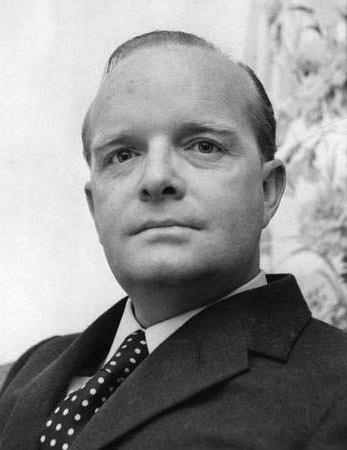 |
| Truman Capote |
frankenstein
If you think that Mary Wollstonecraft Shelley's 1818 novel
Frankenstein; or, The Modern Prometheus is a horror story, think again.
It's more science fiction than horror. In fact, although it combines
elements of the Gothic novel, the Romantic Movement, philosophy, and the
horrific, most experts classify it as one of the earliest true science
fiction stories.
Although today the Frankenstein story has the status of a legend, it
came to her one night in a dream. It's a pure invention, a dream that grew
a legend, a tradition, a cultural myth. it's so much a myth that some
people who haven't read the story incorrectly believe
How did Shelley's dream grow into a legend?
Victor Frankenstein has a name. One of the things that bothers the
monster is that his creator didn't care enough about him to give hime a
name.
why phisosophical? Raises issues: Does man have the right to create
life? if man crates life, does that make him Godlike? If so, does he have a
moral responsibility for the life he creates? Does he have a moral
responsibility to take care of his creation?
legend is a dream
source of horror--plays, movies, books
relation to Jules Verne, et al
product of her creative genius: personal innovation + same stirrings
as--Industrial Revolution, rise of science and engineering
The ability to write creatively does not have to be inborn, although
a lust for living, a natural creative bent, and a thoughtful, analytic, innovative
approach to answering big or little questions helps greatly.
Writers often find external incentives to write creatively if they live
in a period when society is undergoing fundamental changes that they
strongly embrace, if they identify with a great artist whom they believe to
be a kindred spirit, or if they affiliate with an artistic movement toward
which they feel strongly attracted, especially a revolutionary one.
Notice that, like a giant magnetic pole, these kinds of external-world factors can,
if a writer responds to them powerfully, exert powerful
forces on a writer's creative juices if he possesses a powerful positive or
negative internal pole.
Creative writing takes place most often when an author has a strong desire
to see and feel external worldly forces differently from the way other
people see them and when he is highly motivated to
express his unique viewpoint as well as he can. If a writer is on a personal
mission...if he has fire in the belly...if he burns with a thirst to reform or to awaken some aspect of
society or human nature...then he inwardly experiences a font of ideas, emotions,
and words.
This fount springs forth spontaneously, naturally, without straining;
it's the easier part of the creative writing process. The
rest of the task is a relatively painful and laborious one in
which the writer tries to accurately convert these honest, inward,
subjective apprehensions to outward, objective
expressions and to capture them on paper.
Truman Capote—the nonfiction novel
In the last century there arose another, even more compelling example of
the nexus between creative writing and exposition than had come from the brilliant essay writers of previous centuries.
Truman Capote, American
novelist, short-story writer, and playwright—primarily a writer of
fiction—who was at a point later in his career when he
had became preoccupied with journalism, developed a journalistic approach to the novel
which he called the nonfiction novel.
In 1965, Capote published what is perhaps his
best-known work, In Cold Blood, a chilling account of the real-life multiple
murder of a Kansas farm family committed by two young psychopaths. Capote spent six years
interviewing the principals in the case before publishing his book.
The book is the story of actual people and events told in the dramatic
narrative style of a novel and also in the reportage style of a newspaper
account. The story is told from the points of view of different
“characters,” while the author carefully avoids intruding his own comments
or distorting fact.
Capote's goal was to expose the nature of this kind of crime and the
madness behind it as if his book were
an objective, expository treatise on the criminally insane or as if it were a newspaper account of a
crime, at the same time projecting the emotional impact, expressiveness, and depth
of insight usually associated with an important fictional work.
He had deliberately forged a new non-fiction genre whose key concept was
that it was based on expository prose.
Jack Kerouac—spontaneous prose
On the Road is a novel by Jack Kerouac
that he based on a series of motorcycle road trips that he and his friends took across middle America early in 1950 and before.
Although it is represented to be a work of fiction, Kerouac's book is
based on fact and is largely autobiographical. It is written in the style of a roman à
clef.
A roman à
clef, sometimes called an historical novel, is a novel that represents actual events and characters under the
guise of fiction. The prose narration of a roman à
clef is fictional but the events and characters it depicts are real.
Details of events and characterizations may be fictional to an extent that
depends on such factors as the novelist's narrative treatment, the degree
to which facts are available and are incorporated by the the novelist, and
the extent of fabrication to which the novelist is willing to go to make
his points.
The book's hero is really Kerouac; its character's are his real friends—his
traveling companions—and the people they meet
on their adventures. Characters and events are only mildly disguised, if at
all. Kerouac is the
narrator and he speaks in the first-person; the book's voice is his.
An account of his post World War II adventures and
exploits, the book is filled with offbeat tales and out-of-the-ordinary
events concerning jazz, poetry, and drugs. Although he changed many of the
details of their names, characters, personalities, attitudes, experiences,
behavior, and places, many of the people and events have real life
counterparts. Primarily, only the names have been changed to protect the
innocent and to shield the author and publisher from lawsuits.
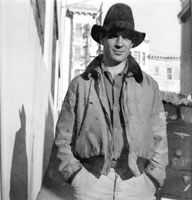 |
| Kerouac on the road |
In the late 1940s, prior to writing On the Road in 1951, Kerouac
had invented and introduced the term Beat Generation to his
immediate associates, and subsequently to the public at large, to describe
an underground anti-conformist youth movement underway and gaining momentum
in New York. Initially he applied the term beat to describe people
who were sick-and-tired or beaten down; later he expanded his notion of a
beatnik to describe upbeat characteristics such as upbeat or
beatific, which he associated with the expression on the beat
that was well-established and popular in jazz music at the time.
One of the Kerouac's major objectives in writing the book was to inform,
influence, and spread Beat principles and ideas to an audience that
was larger than those in New York that he had previously dubbed beat.
The book was his way of defining, creating, and spreading the ideology and
value system he had adopted and made his own, that of the so-called Beat
Generation.
Kerouac is considered by many to be the father of Beat social movement. Kerouac's book not only inspired America's youth to become beatniks, it
helped produce a group of American post-WWII beat writers of the 1950s who
followed the book's ideas about the right way to live and who adopted and
emulated Kerouac's writing style. It and the Beat movement it
fostered led to the
Hippie movement that followed in the mid-1960s; and the term hipster,
which later was used to denote a hippie, was initially coined to describe
the pre-hippie beatniks who had moved into San Francisco's Haight-Ashbury
district.
Kerouac's writing style, which he called spontaneous prose, is a
literary technique similar in some respects to the stream of
consciousness writing style. In it, you may see a resemblance to the
writing style of James Joyce, whom Kerouac admired and attempted to follow.
His technique for writing non-fiction prose consists of about ten
factors, principles, or methods. For the most part, the following textual fragments are
quotations; they're paraphrases
taken from Kerouac's own description of how he wrote and what he wrote
about:
- Undisturbed flow from the mind of personal secret idea-words, blowing
(as per jazz musician) on subject of image.
- No periods separating sentence-structures already arbitrarily riddled
by false colons and timid usually needless commas-but the vigorous space
dash separating rhetorical breathing (as jazz musician drawing breath
between outblown phrases).
- No pause to think of proper word but the infantile pileup of
scatological buildup words till satisfaction is gained.
- Modern bizarre structures (science fiction, etc.) arise from language
being dead. Follow roughly outlines in outfanning movement over subject,
as river rock, so mindflow over jewel-center need (run your mind over it,
once) arriving at pivot.
- If possible write "without consciousness" in semi-trance (as Yeats'
later "trance writing") allowing subconscious to admit in own uninhibited
interesting necessary and so "modern" language what conscious art would
censor, and write excitedly, swiftly, with writing-or-typing-cramps, in
accordance (as from center to periphery) with laws of orgasm, Reich's
"beclouding of consciousness." Come from within, out-to relaxed and said.
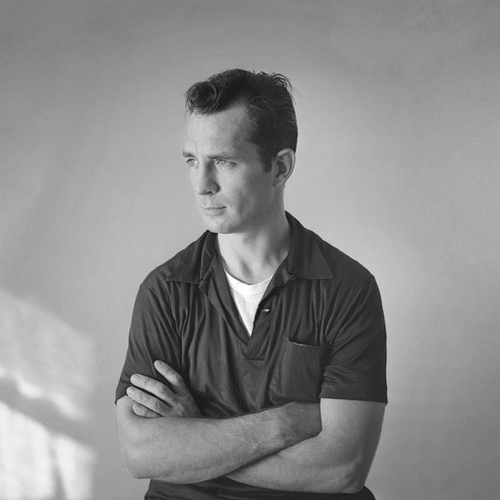 |
| Jack Kerouac |
This phraseology may seem offbeat to you, but it fits the beat
mindset; it's decidedly Beat.
Many poets, writers, actors, and musicians were attracted to Kerouac's
writing style, subject matter, and value system, and were strongly
influenced by On the Road. Among them are Bob Dylan, Jim Morrison,
and Hunter S. Thompson. (The work of the last of these three artists,
Thompson, is examined next on this page.)
Spontaneous prose has evolved into more than just a writing style; it
has become a literary genre.
Judging by the preceding description, it should come as no surprise to
hear that Kerouac is considered a literary iconoclast, a title that is
shared by William S. Burroughs, Allen Ginsberg, and other Beat Generation
pioneers. He had deliberately created the genre in which he and these
others wrote in order to achieve his societal agenda; it was a genre that probably
would have failed his purpose had it not been based on non-fiction
expository prose.
Hunter S. Thompson—Gonzo journalism
Thompson's 1971 book titled Fear and
Loathing in Las Vegas is an account of
a trip he took to Las Vegas with his real-life attorney in his capacity as a
professional news reporter, on an assignment for Rolling Stone
magazine. There he covered a real life convention at a famous hotel and
gambling casino that was sponsored by the National District Attorneys Association's
Conference on Narcotics and Dangerous Drugs.
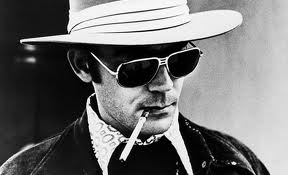 |
|
Hunter S. Thompson |
As with Kerouac's On The Road, Fear and Loathing in Las Vegas
is portrayed as a fictional novel, but the book is based on true people and
events and
is largely autobiographical. And, as with On The Road, Fear and
Loathing is written in the form of a roman à
clef or historical novel; it's a novel that represents actual events and characters under the
guise of fiction.
Like Kerouac, Thompson hides the true identities of the events,
characters, and institutions he is reporting on by changing their real
names, most likely in order to avoid lawsuits; but unlike Kerouac, who published under
his real name, he clouds his personal connection with the book by
publishing under a pen name.
Nevertheless, those in the know understand that the novel's hero, named
Raoul Duke, is
really Thompson and that the book is a true-to-life accounting of what
really happened to Thompson and his attorney, named Dr. Gonzo in the book, at the convention. Thompson is the book's
narrator and it is he who is speaking to us in the first-person, telling us
about his adventure; the book's voice is his. And those in the know also
understand that the hero is covering a convention that in its essentials is
virtually identical to the real convention that Thompson covered for the
Rolling Stone.
On the Road and Fear and Loathing are similar in several
respects, but they differ when it comes to their focus. Kerouac's focus is
on his personal adventures and how they illustrate and justify his
lifestyle. It argues in favor of the case that his lifestyle should be a
role model for others.
But Thompson's focus is farther afield; it's on moral and ethical ideals
and on how America has departed from them.
Normally, most people expect newspaper reporters and magazine writers
like Thompson to report on events
and people factually and objectively; this kind of report would be required by any
managing editor striving to maintain editorial integrity.
But that's not the case here. Thompson's book is not about an article
that he needed to write for Rolling Stone about a drug convention; nor is
it an article for Rolling Stone that he adapted and expanded into a fictional novel.
Fear and Loathing is a fictionalized account of what really happened to Thompson on his trip to Las Vegas that
embodies and expresses his personal perspective on life in America.
Thompson has his hero talk to us in the first person, as though he's
recounting what took place. Writing this way, Thompson makes us feel as
though we might be listening to the hero tell us about his trip while seated in his armchair
in front of his fireplace, sipping cocktails and rubbing his dog while
recounting what
happened on his last assignment.
That might be the way the real Thompson would tell us his real Rolling
Stone story. Thompson is
telling us the truth about what happened to him on his Las Vegas assignment.
what this book is about
During
their trip to Vegas, the hero and his attorney-companion undergo a
variety of adventures, some before and some during the convention, others
afterward and elsewhere. Along
the way they indulge in one adventure after, some that border on dangerous,
others that are funny, and others that are boring to the characters (but
are always interesting to the reader). They take risks; they experience a
mixture of good and bad luck. All their interactions with people and
things expose
raw human nature and the nature of life and living as it really is.
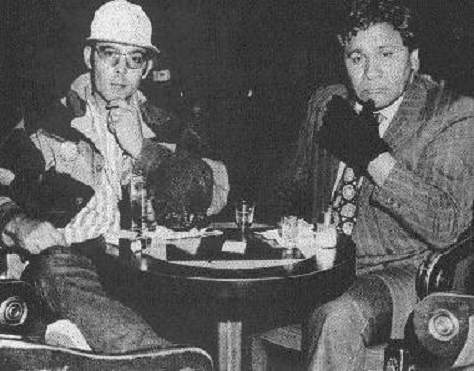 |
|
Thompson (left) and Oscar Zeta
Acosta (Thompson's real-life attorney) |
As the two main characters go round and round on their adventures they pig out.
They
consume large quantities of grass (marijuana),
mescaline, acid (LSD), cocaine,
and a variety of
uppers,
downers,
screamers,
and
laughers, intermixed and interspersed with generous quantities of tequila, rum, Budweiser, raw
ether, and two dozen
amyls. They cheat others and they are cheated by others.
Low life and high life; they're both there. But don't get the wrong idea; this is not a simply retelling of the
hero's escapist sexual, carnal, immoral, and amoral self-indulgences, and
those of his traveling companion. The hero's assignment
is to prepare an article that reports on what he describes as a police narcotics
convention, but something else is preoccupying his mind—the
American Dream.
The hero looks around himself for the American Dream, but doesn't find
it. He's disgusted by what has happened to it. He seeks the good in
America and its culture but finds little left to recommend it.
The hero's adventures bring to mind the under- and above-ground
anti-conformist, anti-authoritarian, anti-establishment movements that were extant in America
in the 1950s and '60s—the counter-culture
movements of the beatniks and hippies and the anti-war demonstrations that
were aimed at bringing home the troops. He believes that the rationale
underlying these movements and their goals were worthy but that their
hopes and dreams went awry.
What happens to the hero on this trip—everything
and everyone he sees about him—prove it; they illustrate and
justify his disillusionment. He's disgusted, sickened, and disheartened.
Is Fear and Loathing a true account of what happened to Thompson
in Las Vegas?
Yes and no. At first the reader is mislead by the book. It turns out
that the story is not about a real convention as it seems to be at first.
It's only secondarily a news report about a drug convention; it's mainly a description of what
went wrong with the American Dream.
Although based on real events, Thompson's account of what happened in
Las Vegas departs from the actual events in its details. It presents
itself as a true-to-life account, but it's not news reporting in the
conventional sense; it's not news. Thompson distorts, avoids, exaggerates,
overlooks, and
discolors facts in order to make his ideas known and his feelings
felt. The story the hero tells allows you to see for yourself what has
gone wrong and to share in his disappointment.
From a literary point of view, Thompson writes a well-told fictional story
that's based on actual facts. But since his story is a mixture of fact and
fiction, he must construct it creatively. He departs from fact when
necessary to make his points. He adumbrates and
selectively omits some events; he shortens and condenses dialog; he edits
narrative to maintain clarity and pacing and to avoid inducing boredom.
But when it comes to his true subject—The
American Dream—he's as honest, complete, and true-to-life as
he can be.
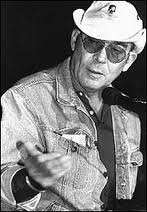 |
| An Older Thompson |
about gonzo journalism
Fear and Loathing is the first major work written in a style
today
known as Gonzo journalism, a writing style which Thompson invented.
What is Gonzo journalism? Gonzo journalism is journalism that takes
place when the journalist (the reporter) is an actual participant in
the live action that is being reported on. Gonzo journalism tends to favor style over
fact to achieve accuracy and often uses personal experiences and emotions
to provide context for the topic or event being covered. It rejects the
polished, edited news product favored by newspaper editors and strives for
a more gritty approach. Use of direct quotations, sarcasm, humor,
exaggeration, and profanity is common.
Gonzo journalism is personal, not objective. It's purpose is to report
honestly on political or moral issues, or on similar issues; but it favors
writing style as a means to convey truth even if it becomes necessary to
sacrifice accuracy to achieve its goals.
Gonzo journalism and gonzo journalists are resolute, courageous, and
plucky. They tend to write abut coarse personal experiences and emotions
as a means to provide context for the topic or event being covered. They
avoid the polished, concise prose and objective reporting normally
expected from newspapers and editors, and they don't hesitate to employ
quotations, sarcasm, derisive humor, exaggeration, or profanity to help
them drive their ideas home.
A Gonzo journalist involves himself in the action
to such a degree that he becomes the central figure in his story; he
personally acts out his story, sometimes literally. He interacts with and
behaves like the people he is reporting on.
This kind of journalism stands in sharp contrast to traditional
journalism, which stresses that events should be reported with total
objectively, minimal use of words, and without personal involvement by the author, except perhaps for
a byline.
 |
| Johnnie Depp, hero in the movie version of
Fear and Loathing in Las Vegas |
Thompson, the Gonzo journalist
The term Gonzo in Gonzo journalism was not invented by Thompson; it was
conceived by
a prominent newspaper editor who had seen and admired an article by
Thompson published prior to Fear and Loathing. He described the
piece to Thompson as "pure Gonzo," explaining that a Gonzo is a
creature of South Boston Irish slang which he defined as the last man standing after an
all-night drinking marathon.
Thompson immediately saw that this idea applied to him; and it fit his
writing style to a "T." He like it. He soon began describing his
reportorial writing style as Gonzo journalism and signed his
published works as Gonzo. His personality, writing style, lifestyle, point
of view, and values all seemed to match the name, and for the rest of his
life he frequently referred to himself as Gonzo when he was with others.
Thompson's writing style was born out of a combination of his
personality, lifestyle, and working habits:
Thompson saw himself as a novelist but earned his living early on as a
writer until he could break into literature. He most admired Ernest
Hemingway from the start, for his adventurous life as a war
correspondent, for his writing style, and for his novels. He emulated his
lifestyle as a sportsman and womanizer and he tried to live the kind of
life that would qualify him as a legend in his own time, the way Papa
did. In fact, Thompson's life was so modeled after Hemingway's that he
committed suicide the way Hemingway did.
Hemmingway's influence was strong in Thompson's life and writing
because he demonstrated career and personality traits that Thompson
admired. But Thompson also demonstrated characteristics that were his
own.
He was possessed by himself and his own moods, attitudes, and
opinions. He felt a psychological necessity to write with his own voice,
to write as himself; and he wrote as he spoke, in the first person. This
meant that he had to narrate what he wrote.
He suffered from a compulsive need to make himself heard instead of
stepping out of the way, as most newspaper men and women do when they
report events or subjects objectively. This drove him to take a
subjective approach to reporting.
Thompson knew how to put words on paper and to craft objective
newspaper articles the way you might expect a competent
newsman to do, but he personally favored a use of language was more vibrant, expressive, penetrating, and colorful
than most factual newspaper reporting. He had an active, innate sense of
humor, much of which was sardonic, and the humor didn't stop; he couldn't
suppress it. These qualities affected and distinguished his style.
He was personally disillusioned, disappointed, and embittered by the
political, social, and ethical conditions he saw at work around him—by
the way his world worked. These sentiments and values affected his
subject matter, tone, and point of view.
Further, he had other professional pursuits and his work required
extensive, time consuming travel. He indulged himself in idle diversions
and pursued hobbies such as guns and hunting. He smoked incessantly and
underwent wild and unremitting bouts with booze and stronger stimulants
which resulted in a chronic mental condition that in
polite circles is called writers block. Instead of setting
aside quiet hours that were sufficient for him to fashion a conventional, carefully-crafted,
polished magazine or news story as most reporters might try to do, he
would frequently put off working on a new piece for publication until it
was dangerously close to its due date.
Under conditions like these—with a
deadline looming but with no copy to submit—he
would approach the challenge of drafting a new piece in a state of sheer desperation;
he would undergo repeated, suffocating, hobbling anxiety attacks that
would cause him to digress even further.
Unable to put last-minute words on paper, he would finally give up in
a panic, rip pages out of his
notebook, and send them in for publication, leaving it to rewrite men to
convert his notes to a piece suitable for publication.
For their part, publishers knew that his pieces were so good—that
his ideas, content, characterization, and writing style were so
powerful and important and that his audience was so
large and hungry—that they allowed him the leeway to work in this
way. That's why Thompson's writing sounds more like his personal notes
about something he's witnessing "now" rather than like an anonymous
reporter's objective account about something that had happened to some
third party in the past.
That's not to say that Thompson couldn't write a competent conventional
news story or that he didn't write well when
circumstances allowed; he cooperated with publishers when feasible. Fear and Loathing
attests to this fact. He could
draft punchy, understandable sentences and paragraphs that were economical, crisp, lean
and clean, neat,
incisive, logically organized, thought-laden, provoking, and to the point. His dialog was concise,
conversationally interactive, and believable. His references to
real people and events were sharp, current, and direct; and he could name real
people and cite real events when it suited him.
birth of a genre?
Thompson lived what he wrote and he wrote what he lived. Thompson is the
hero in Fear and Loathing and the hero in Fear and Loathing is Gonzo.
Gonzo journalism was born out of Thompson's values, his own personality,
the social conditions in which he found himself, and the stressful circumstances under which he lived and wrote.
It took a man of these characteristics to create the new kind of
journalism we call Gonzo journalism.
Despite criticism—perhaps partly because of it—Thompson
soon incorporated his Gonzo journalism news reporting style
in everything he wrote, from "factual" magazine articles to literary works like the novel,
Fear
and Loathing.
Thompson's new and insightful writing style became noticed by editors
soon after he started using it. Some liked
it but others were repelled by it. That didn't deter him. Since he believed that journalistic objectivity is a myth, he saw no
professional or ethical problem with injecting subjectivity into journalism if it helped bring out
underlying truth. He continued to write about subjects that were important
to him, about the ideas and ideals he valued, at whatever cost.
These attributes appealed to his reading audience. His Gonzo writing
style soon caught on with
readers and with other writers. It wasn't long before Gonzo journalism
began to evolve into a genre.
Eventually Gonzo journalism became a style of writing that is generally
accepted by most readers, even if it's still avoided by publishers who
report hard news. It's a style that elevated the importance of "telling it
like it is." Today it's classified as a sub-genre of another subjective
journalism style called New Journalism, which was developed in the 1960s
and '70s by
authors like Tom Wolfe, Truman Capote, Norman Mailer, George Plimpton, and
others.
|
|
—note— new journalismNew Journalism is a genre that does not conform to the dispassionate and
even-handed paradigm historically associated with traditional journalism.
Works in this genre not only report facts, they
attempt to convey feelings and emotions by incorporating literary devices
usually encountered in fictional works like novels.
New Journalism is a creative non-fictional
genre in its own right. It not only reports facts, it establishes character, explores
motivation and thinking, and employs other techniques normally associated
with novel writing. |
Thompson died in 2005 at the age of 67. Since then his contributions
have not only influenced journalism; his life and work have affected the
collective conscience and the collective unconscious of society as a whole.
His ideas and approaches have shown up in novels, documentaries, and works
of art. Many websites are devoted to Thompson; and his ideas about
reporting news and journalism have even affected the way ordinary people,
not professional writers or journalists, express themselves on blogs and at web sites like Facebook
and Twitter.
Umberto Eco
[creating genres--still going on]
The Muse suggests that you ponder these questions in the light of the
works contributed by Capote, Kerouac, and Thompson:


